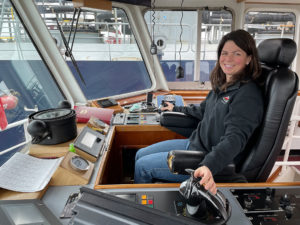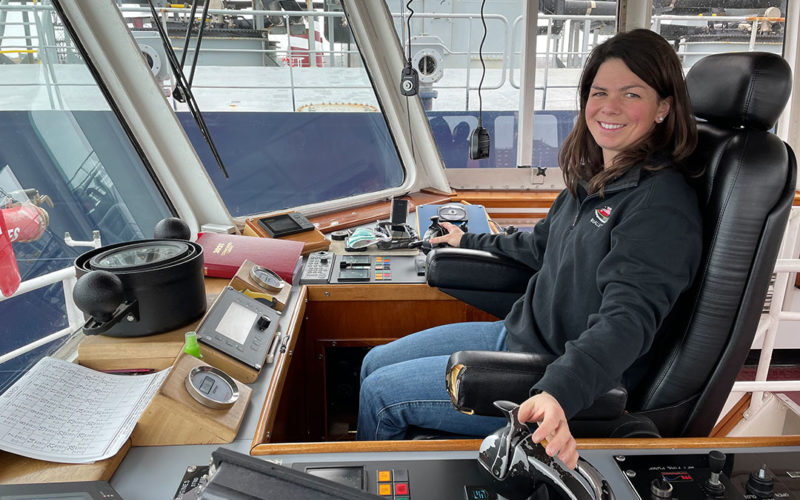
Palanca Rio backed away from the terminal on a damp and dreary spring morning in Maine. Capt. Sarah Kaplan, helming the tugboat Andrew McAllister, stretched her line and began pulling aft to swing the tanker’s bow to port.
The ship, carrying only ballast after offloading its asphalt cargo over the preceding day, spun more than 90 degrees without difficulty. Within minutes of getting underway, it was centered in the Fore River and beginning its outbound transit from Portland.
“I’m sorry we didn’t have a more interesting job for you,” Kaplan said as the ship started moving ahead toward the open waters of Casco Bay.
The undocking maneuver was typical for McAllister Towing’s Maine tugboat crews, who are accustomed to assisting tankers calling on the Fore River terminals. But the voyage itself was somewhat unique given the all-female crew aboard the 6,000-hp Andrew McAllister.
Kaplan, a two-year captain with McAllister, was joined on the voyage by deck hands Keely Ryan and Kelsea Anair. The three work different schedules, but once or twice a month they align for a week at a time.
“We like to have fun,” Kaplan said after the tug returned to the company dock in downtown Portland. “We don’t take ourselves too seriously, but we do our jobs well.”
Andrew McAllister got underway from the Maine State Pier at about 1100 for the noon job working the Marshall Islands-flagged Palanca Rio. The 437-foot ship was docked at Global Terminal, about two miles away on the South Portland side of the river.
Kaplan steered the tugboat around the pier’s eastern edge and turned west in the Fore River. The vessel passed the city’s working waterfront that is still home to bustling fish markets, seafood exporters and lobster wholesalers.
The past year has been challenging for Portland, as it was for many smaller ports across the United States. Fewer tankers called on the region as demand fell for gasoline and other petroleum products. The lack of cruise ships, large and small, weighed on the local maritime sector and the city’s tourism industry.
The pandemic-related disruptions came amid historic changes in the region’s shipping needs. The Portland-Montreal Pipe Line, which used to bring a dozen large tankers a month, now draws just a few ships a year. The paper and wood products trade has slowed dramatically, although there is some optimism it will bounce back in a different form.
“This is the first full year that we haven’t moved a forestry product from Portland in forever,” Capt. Brian Fournier, who leads McAllister’s Portland office and the Portland docking pilots, said while transiting to Palanca Rio aboard Andrew McAllister.
Other trends within the port are more positive. The city’s container facility at the International Marine Terminal does a robust trade with Iceland through the Eimskip shipping line. Bottled water, frozen fish and numerous other products move back and forth between the two nations. The 459-foot, Portugal-flagged containership Pictor was docked at the terminal as Andrew McAllister passed by.
Minutes later, the tug passed under the Casco Bay Bridge marking the edge of the harbor. Palanca Rio lay about a mile ahead, berthed starboard side to the terminal that runs perpendicular to the river. Kaplan came alongside and Fournier climbed aboard the ship carrying a stack of periodicals for the crew. Anair got a line onto the tanker while Fournier made his way to the bridge.
The ship got underway shortly after noon with Andrew McAllister positioned at the port bow and the 1,800-hp Roderick McAllister working off the stern. The two tugs worked initially to keep the ship from moving side to side in either direction.
“They just keep me safely in the channel and as straight as I could possibly go,” Fournier explained later. “I don’t want the stern or bow getting too far off that pier because there is not a lot of water.”
Fournier issued a series of engine commands as the ship backed off the terminal. Kaplan acknowledged each with a short whistle rather than over radio, a local tradition that started before the advent of VHF. Fournier released Roderick before Andrew began backing to swing the bow counterclockwise, to the east. Before long, the ship was centered in the channel and ready for departure.
Kaplan is a Maine Maritime Academy graduate who spent eight years moving oil barges for Kirby on the West Coast. A Maine native, she returned home about five years ago to work for a marine construction company on the coast.
The job change gave her the chance to go home on most nights instead of commuting cross-country every six weeks. She joined McAllister full time after first serving in a relief role. “I like it,” she said of the ship-assist work. “I just wish we were busier.”
Joining McAllister provided her first full-time ship-assist experience, and Andrew McAllister is her first tractor tug. She considers the vessel “a tank” that uses its heft effectively when docking and undocking tankers and other ships calling around Portland. What it lacks in agility it makes up for in power.
“Most of what we are doing (in Portland) is sticking to one side (of the hull) and just pushing and pulling,” she said.
Ryan grew up on boats in New England, and her mom came from a fishing family. Ryan took a traditional “hawsepiper” route into the industry, starting her career as a deck hand on tour boats in Hawaii. She earned enough sea time to qualify as a small boat captain.
“I then drove tour boats and later workboats and small tugs in Pearl Harbor,” she said. “I was able to get onto the (P&R Water Taxi) Tiger Tugs in Pearl Harbor as a deckhand, which gained me the sea time I needed to eventually test and upgrade to my 500-ton mate’s license.”
Ryan returned to New England during the pandemic and was hired by McAllister last fall. “Portland is a gem,” she said of the city’s scenic harbor. “It’s like the Hawaii of New England. It is so beautiful here.”
Anair, who grew up in Maine, graduated last year from Maine Maritime and is preparing to test for her 1,600-ton license. She said her classes had multiple women, and many are preparing for careers at sea.
Although it is not common to have an all-female crew on an American tugboat, the U.S. towing industry is adding more female sailors all the time. Roughly 160 of the nearly 1,000 students at Marine Maritime are women, while at the U.S. Merchant Marine Academy, women account for about 200 of the 1,000 or so students.
Details on the total number of female mariners working in the Jones Act trade could not be found.
Kaplan, Ryan and Anair admitted that working on an all-female tugboat crew was unusual, but each has worked alongside other female mariners elsewhere in their careers. Ryan worked with capable female captains in Hawaii, but considers her mom her biggest inspiration.
Kaplan, who worked alongside excellent female mariners at Kirby, said she focuses on being a good mariner, period.
That is the culture McAllister is trying to create, said Fournier, who handpicks his crews based on their skill and competence rather than their gender. “We are a small port and a small company,” he said. “Everyone gets along, everyone is treated equally, and everyone is expected to do the job at the same high level.”
Andrew McAllister kept its line on Palanca Rio’s port bow as the ship sailed toward the Casco Bay Bridge at 4 knots. The channel is mostly straight between the Global Terminal and the bridge except for a short dogleg.
The bascule bridge dutifully swung upward as the tanker approached. Fournier, comfortable with the ship’s heading, released Andrew McAllister a quarter mile from the span. Anair and Ryan hauled in the line while Kaplan tucked in along Palanca Rio’s port side. She let the ship pass through the bridge’s narrow opening and then followed behind it.
At this point, Fournier handed over the conn to the sea pilot on board, who would guide the ship out to the pilot station 7 miles past the iconic Portland Head Light. Fournier walked to the boarding ladder and climbed down as Anair and Ryan held it in position against the ship’s hull.
Palanca Rio continued to its next port while Andrew McAllister returned to the Maine State Pier. The crew took a short rest before heading deeper into the Fore River for another tanker-assist job later that evening. •

